By David Wesley & stephanie loveless
SEVEN YEARS AFTER MICHELLE MIROWSKI LAID THE FOUNDATION for the Underwood V radio collective, and more than 20 years after free-speech activists all across the country began clamoring for access to the public airwaves…Ferndale is about to switch on the dial for our very own community radio station: 100.7 FCR FM.
The project is still in development, but as the ink dries on these pages volunteers are testing the equipment for the station. The station is expected to go live with a test signal and recorded information in the weeks ahead with a full programming schedule by Fall.
Ferndale Community Radio (FCR) is physically located inside of the Rust Belt Market at the northwest corner 9 Mile and Woodward. Owners Chris and Tiffany Best have generously offered rent-free space for the FCR broadcast studio, as well as a place on the Rust Belt roof for the essential tower and antenna.
FCR is a 100-watt LPFM (short for Low Power Frequency Modulation) station, with a projected broadcast range of perhaps two miles in any direction. We’re about to find out exactly how far FCR will reach, as soon as all the bugs get worked out. LPFM stations are required to make sure their signal does not interfere with existing, mega-watt commercial stations. Because of the congestion on the radio dial, FCR is likely to be the only LPFM station licensed in the Metro-Detroit area in the foreseeable future!
LPFM licenses are only available to community-oriented, educational, non-profit organizations. In this case, 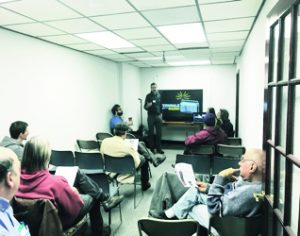 the non-profit behind FCR is Underwood V, a collective founded by Mirowski and friends. Board members include Mirowski, president; Dave Phillips, secretary/social media; Dave Kim, treasurer/promotions; Jeremy Olstyn, programming/training; and Keith Fraley, radio engineer. They are looking to fill DJ and other station positions. Interested volunteers should contact
the non-profit behind FCR is Underwood V, a collective founded by Mirowski and friends. Board members include Mirowski, president; Dave Phillips, secretary/social media; Dave Kim, treasurer/promotions; Jeremy Olstyn, programming/training; and Keith Fraley, radio engineer. They are looking to fill DJ and other station positions. Interested volunteers should contact
ferndaleradio@gmail.com.
THE MISSION OF THE STATION is to provide a kind of “hyper-local programming” that is impossible to find anywhere else on the dial. Their mission statement speaks of “community engagement, promotion of community events, specialty broadcast, and more. Potential programming for the station includes: On-air book clubs, interviews with local news-makers, coverage of government and board meetings, sports coverage,” etc.
The road to Ferndale’s first and only community radio station began over 20 years ago, when LPFM stations didn’t even exist. Ferndale Friends publisher Stephanie Loveless helped lead a national movement of democracy activists who ultimately convinced Congress and the Federal Communications Commission in 2000 to create the LPFM service, so that ordinary Americans could actually use the airwaves we already own. However, the powerful broadcast industry was able to limit the new rules so that it was impossible for even one LPFM station to go on the air in all of Metro Detroit.
However, eleven years later, President Obama signed legislation which loosened those rules enough so that it finally became possible for Metro Detroit to have one LPFM station – and it had to be in Ferndale!
So, FCR is practically a miracle. Our miracle. But it only exists because Michelle and her friends stepped up and applied for a construction permit when the FCC opened up a licensing window three years ago.
That was the easy part.
Next, they had to find a physical location for the studio, antenna and tower. And there were innumerable issues involving the City of Ferndale which had to be overcome: Not too many people walk into City Hall hoping to launch a non-profit community radio station, after all. This was brand-new territory for everyone involved. They had to find an engineer and a properly-qualified team for the construction of the tower and antenna. Negotiations with the landlord, etc.
This project would also require a significant amount of money – in fact, a little over $15,000 just to get started. So, on top of everything else, our worthy Underwood V volunteers were now charged with hustling up the cash, via social media, fundraisers, and underwriting agreements with local businesses. These fundraising efforts continue, and if you are interested in contributing, go to www.ferndaleradio.com. And local businesses are encouraged to underwrite the station financially in return for generous on-air mentions.
MANY TIMES OVER THE LAST TWO YEARS, it looked as if the money would not be found, and the whole project would have to be scrapped. But FCR supporters refused to accept defeat, and in recent weeks the decision was made to start purchasing the necessary gear: FCR is GO!
With the help of The Rust Belt and tons of local donations and support, Michelle and her team are ready to make the fresh and impactful change in radio that will nourish local talent and influence Ferndale life through the years to come.
FCR will have an impact on the Rust Belt too. Shoppers will be able to hear the station inside while they shop and will be able to meet the FCR team. It will create a more unique shopping experience.
Ferndale Community Radio will give the Ferndale residents another tool to communicate with each other. FCR has given the city something extremely unique to look forward to as it’s extremely rare that a city has their own community station!
Once they are up-and-running, they plan to partner with lots of organizations in Ferndale. For example, the schools. This will also be a great forum for local musicians from all genres to have their music heard. This will be an avenue for the creative projects that make Ferndale so noteworthy. The station will be here soon – to enrich our already vibrant and talented community.
Initial Sponsors & Underwriters
Ferndale Friends
The Rust Belt Market
Jim Shaffer & Associates
Western Market
Stange Sports
Found Sound
Crane Optical
HiLo Guy
313 Brand Co.

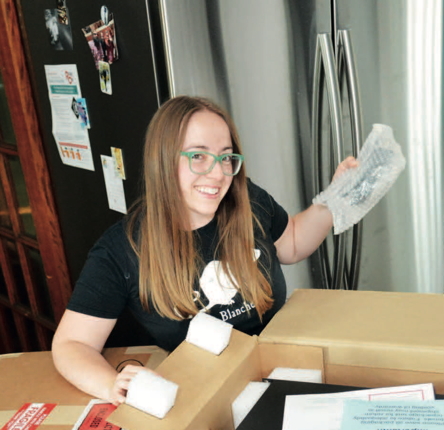
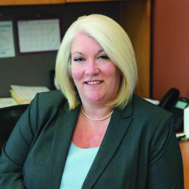
 legislative and policy push aimed at reforming the way finances are being handled with the direct purpose of encouraging renewed investment in communities. “The theme is that local units shouldn’t just be surviving, they should be thriving,” says Sheryl Stubblefield, Finance Director for the City of Ferndale. The League will be developing policy recommendations specifically around three themes: Cost Containment, Revenue Enhancement, and Structure of Government.
legislative and policy push aimed at reforming the way finances are being handled with the direct purpose of encouraging renewed investment in communities. “The theme is that local units shouldn’t just be surviving, they should be thriving,” says Sheryl Stubblefield, Finance Director for the City of Ferndale. The League will be developing policy recommendations specifically around three themes: Cost Containment, Revenue Enhancement, and Structure of Government.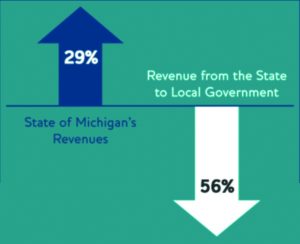 move out of our communities and out of our state, we begin this downward spiral, that will be nearly impossible to recover from,” Stubblefield explains. Basically, the less communities are able to offer residents and those visiting, the less likely they are to remain populated, and the less revenue the cities generate in the long run. It’s a vicious cycle.
move out of our communities and out of our state, we begin this downward spiral, that will be nearly impossible to recover from,” Stubblefield explains. Basically, the less communities are able to offer residents and those visiting, the less likely they are to remain populated, and the less revenue the cities generate in the long run. It’s a vicious cycle.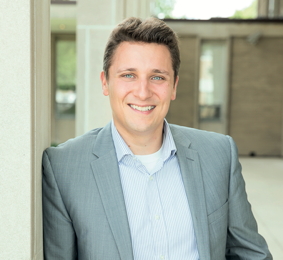
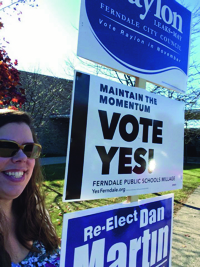
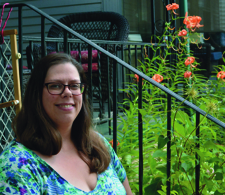 2000 presidential ‘selection’ it was obvious that our electoral system was badly broken in several fundamental ways,” she recalls. “Even though a majority of Americans voted for a more progressive candidate – either Al Gore or Ralph Nader – the rules of our system allowed a conservative candidate to be the plurality winner. IRV emerged as a viable reform that, if enacted, would lead to a more democratic result.”
2000 presidential ‘selection’ it was obvious that our electoral system was badly broken in several fundamental ways,” she recalls. “Even though a majority of Americans voted for a more progressive candidate – either Al Gore or Ralph Nader – the rules of our system allowed a conservative candidate to be the plurality winner. IRV emerged as a viable reform that, if enacted, would lead to a more democratic result.”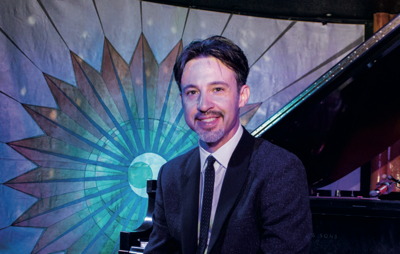

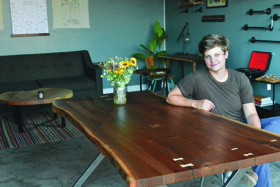 studio space inside the Russell Industrial Center in Detroit. Holtzman graduated college with a degree in anthropology, and was even getting knee-deep into some archaeological works just before she and Erickson got started. But, as she said, “the hobby (woodworking) started turning into a full time gig!”
studio space inside the Russell Industrial Center in Detroit. Holtzman graduated college with a degree in anthropology, and was even getting knee-deep into some archaeological works just before she and Erickson got started. But, as she said, “the hobby (woodworking) started turning into a full time gig!”
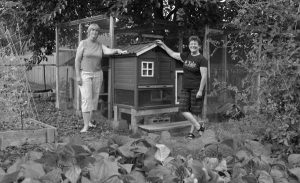 blackberries, peach trees and tomato plants is the coop. There, we meet Dottie (a speckled Sussex), Figaro (Austrolorp) and Lacey (double-laced Barnevelder). Their hens survive just fine in the winter, although they don’t like stepping on the snow. They also have a tiny house for shelter, warmth and, of course, laying eggs. Hens typically lay an egg about once every 25 hours. So, on a given day, Holly and Julia get anywhere from zero to three eggs. While the $35 yearly permit fee may not make eating your own eggs much more feasible than buying them at a store, nothing beats homemade. “Their eggs are amazing,” Holly said. “Truly delicious, and we know exactly what goes into them.” Even the good, organic eggs you pick up at the farmer’s market can’t stand up to getting them from your own backyard.
blackberries, peach trees and tomato plants is the coop. There, we meet Dottie (a speckled Sussex), Figaro (Austrolorp) and Lacey (double-laced Barnevelder). Their hens survive just fine in the winter, although they don’t like stepping on the snow. They also have a tiny house for shelter, warmth and, of course, laying eggs. Hens typically lay an egg about once every 25 hours. So, on a given day, Holly and Julia get anywhere from zero to three eggs. While the $35 yearly permit fee may not make eating your own eggs much more feasible than buying them at a store, nothing beats homemade. “Their eggs are amazing,” Holly said. “Truly delicious, and we know exactly what goes into them.” Even the good, organic eggs you pick up at the farmer’s market can’t stand up to getting them from your own backyard. every few days in their thermos. We also provide some grit to help them process the eggs, and diatomaceous earth to roll in during the summer to keep them bug free.” Holly and Julia clean or resurface their yard two times a year, and regularly check the yard to make sure it’s secure from critters. Julia said they do see some digging from time to time, but their hens have never been in danger.
every few days in their thermos. We also provide some grit to help them process the eggs, and diatomaceous earth to roll in during the summer to keep them bug free.” Holly and Julia clean or resurface their yard two times a year, and regularly check the yard to make sure it’s secure from critters. Julia said they do see some digging from time to time, but their hens have never been in danger.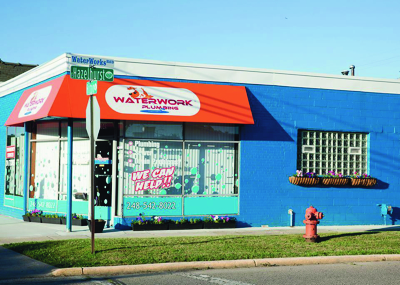
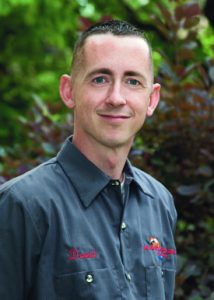 a very well-paying job.” According to David, there’s a shortage of plumbers coming from the next generation. Currently, there is a specific need at WaterWork for journeymen and master plumbers. “If someone walks through my door with a lot of experience, they’re not leaving,” David laughs.
a very well-paying job.” According to David, there’s a shortage of plumbers coming from the next generation. Currently, there is a specific need at WaterWork for journeymen and master plumbers. “If someone walks through my door with a lot of experience, they’re not leaving,” David laughs.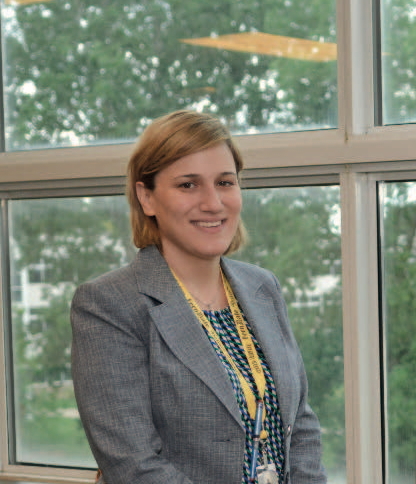
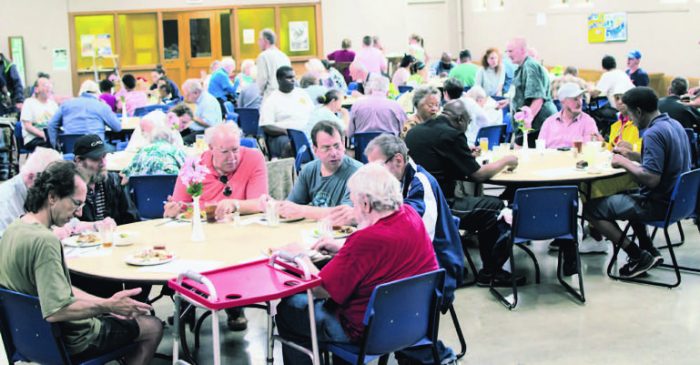
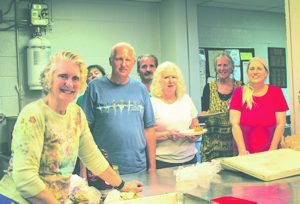 up for one month, and a core group of volunteers from the Methodist Church and Christ the Good Shepherd Catholic Church are always involved.” She adds, “They come out to run the dishwasher and do various tasks, but we are always looking for new people to head up a group, do the cooking.” The church is specifically looking for volunteers for meals in August and September.
up for one month, and a core group of volunteers from the Methodist Church and Christ the Good Shepherd Catholic Church are always involved.” She adds, “They come out to run the dishwasher and do various tasks, but we are always looking for new people to head up a group, do the cooking.” The church is specifically looking for volunteers for meals in August and September.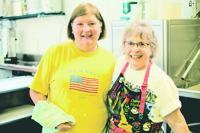 “They did Halloween last year and the 4th of July this year,” Mary says. “It’s a very festive atmosphere” when the Catholic church hosts, and they often have extras set up such as arcade machines for guests to enjoy.
“They did Halloween last year and the 4th of July this year,” Mary says. “It’s a very festive atmosphere” when the Catholic church hosts, and they often have extras set up such as arcade machines for guests to enjoy.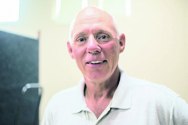 and for the general logistics involved, including seating and flow. For all other inquiries regarding upcoming church activities and how you can help, call the church office at 248.545.4467 and speak with Stacy, the church’s secretary.
and for the general logistics involved, including seating and flow. For all other inquiries regarding upcoming church activities and how you can help, call the church office at 248.545.4467 and speak with Stacy, the church’s secretary.